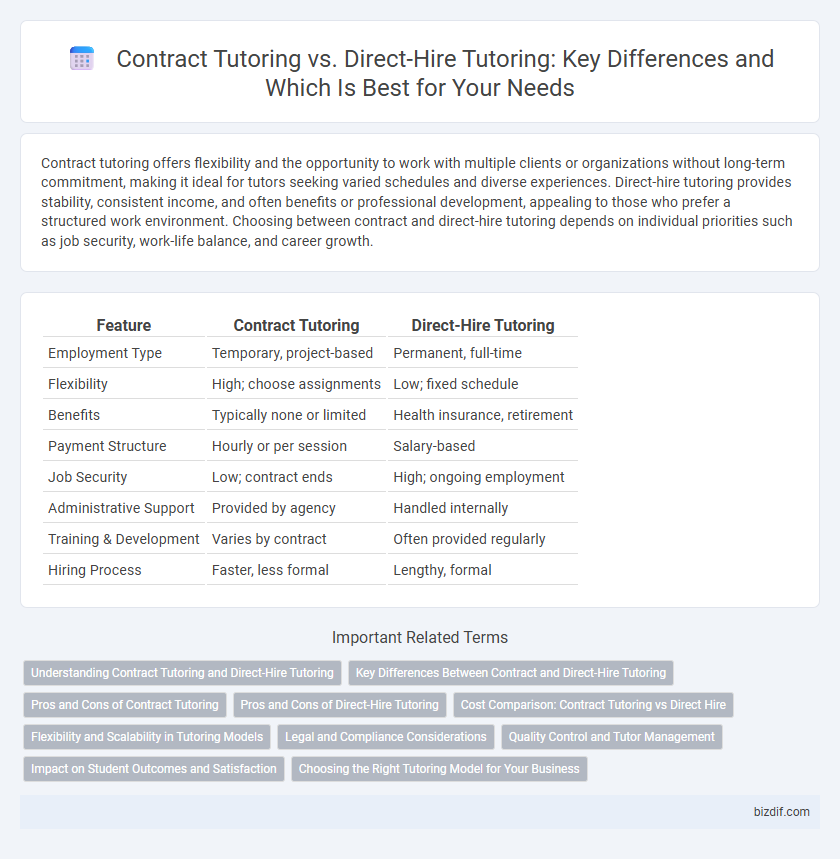Contract tutoring offers flexibility and the opportunity to work with multiple clients or organizations without long-term commitment, making it ideal for tutors seeking varied schedules and diverse experiences. Direct-hire tutoring provides stability, consistent income, and often benefits or professional development, appealing to those who prefer a structured work environment. Choosing between contract and direct-hire tutoring depends on individual priorities such as job security, work-life balance, and career growth.
Table of Comparison
| Feature | Contract Tutoring | Direct-Hire Tutoring |
|---|---|---|
| Employment Type | Temporary, project-based | Permanent, full-time |
| Flexibility | High; choose assignments | Low; fixed schedule |
| Benefits | Typically none or limited | Health insurance, retirement |
| Payment Structure | Hourly or per session | Salary-based |
| Job Security | Low; contract ends | High; ongoing employment |
| Administrative Support | Provided by agency | Handled internally |
| Training & Development | Varies by contract | Often provided regularly |
| Hiring Process | Faster, less formal | Lengthy, formal |
Understanding Contract Tutoring and Direct-Hire Tutoring
Contract tutoring involves hiring tutors through an agency or third-party service, providing flexibility and access to specialized expertise without long-term commitments. Direct-hire tutoring means employing tutors directly, allowing for greater control over the tutoring process and building a consistent learning relationship. Both models impact cost, tutor availability, and customization of educational support.
Key Differences Between Contract and Direct-Hire Tutoring
Contract tutoring offers flexible, project-based engagements where tutors work for multiple clients without long-term commitments, while direct-hire tutoring involves permanent employment with a single institution or company. Contract tutors manage their schedules independently and often handle their own taxes and benefits, contrasting with direct-hires who receive employer-provided benefits and steady income. The key differences lie in job security, administrative responsibilities, and the level of commitment expected from the tutor.
Pros and Cons of Contract Tutoring
Contract tutoring offers flexibility and varied experience by allowing tutors to work with multiple clients or organizations without long-term commitment, often providing higher hourly rates. However, contract tutors face inconsistent income, lack of benefits such as health insurance and retirement plans, and limited job security compared to direct-hire positions. The need to manage taxes independently and handle administrative tasks further adds to the challenges of contract tutoring.
Pros and Cons of Direct-Hire Tutoring
Direct-hire tutoring offers the advantage of a more personalized and consistent learning experience, as tutors are directly employed by the family or institution, ensuring better alignment with specific educational goals. However, this approach often entails higher costs due to the absence of agency intermediaries and increased responsibilities such as tax management, scheduling, and performance oversight. Direct-hire tutoring provides greater control and continuity but requires more administrative effort and commitment from the hiring party.
Cost Comparison: Contract Tutoring vs Direct Hire
Contract tutoring often entails higher hourly rates due to agency fees but reduces administrative burdens such as payroll and benefits management. Direct-hire tutoring typically lowers overall costs by eliminating third-party fees, although it requires more involvement in hiring, training, and compliance processes. Businesses must weigh immediate cost savings against long-term operational responsibilities when choosing between contract and direct-hire tutoring solutions.
Flexibility and Scalability in Tutoring Models
Contract tutoring offers unparalleled flexibility by allowing clients to scale services up or down based on immediate needs without long-term commitment, ideal for fluctuating demand. Direct-hire tutoring provides consistent, dedicated support with deeper alignment to student goals but often lacks the rapid adaptability found in contract models. Scalability in contract tutoring enables quick expansion or reduction in tutor numbers, while direct-hire models require more time and resources to adjust to changing tutoring demands.
Legal and Compliance Considerations
Contract tutoring requires clear agreements outlining intellectual property rights, confidentiality, and payment terms to ensure compliance with labor laws and tax regulations. Direct-hire tutoring involves adhering to employment laws, including wage standards, benefits, and workplace safety, with a greater emphasis on long-term employee rights and obligations. Both models must consider local regulations and data protection laws to mitigate legal risks and maintain ethical tutoring practices.
Quality Control and Tutor Management
Contract tutoring offers structured quality control through agency oversight, standardized training, and regular performance evaluations, ensuring consistent tutor reliability. Direct-hire tutoring provides greater flexibility in tutor selection and personalized management, but places the responsibility for maintaining quality and monitoring progress directly on the client. Effective tutor management in both models requires clear communication, consistent feedback, and systematic assessment to optimize student outcomes.
Impact on Student Outcomes and Satisfaction
Contract tutoring often limits personalized interaction due to standardized protocols, which can reduce student engagement and satisfaction compared to direct-hire tutoring. Direct-hire tutors typically tailor their teaching methods to individual learning styles, positively impacting student outcomes through customized support and immediate feedback. This personalized approach contributes to higher student retention rates and improved academic performance.
Choosing the Right Tutoring Model for Your Business
Contract tutoring offers flexibility and reduced administrative burden by outsourcing tutor management, making it ideal for businesses prioritizing scalability and cost control. Direct-hire tutoring provides greater control over tutor quality, curriculum alignment, and brand consistency, which benefits companies seeking a tailored and long-term educational approach. Evaluating factors such as budget, growth projections, and desired level of oversight is crucial to selecting the most effective tutoring model for your business goals.
Contract Tutoring vs Direct-Hire Tutoring Infographic

 bizdif.com
bizdif.com